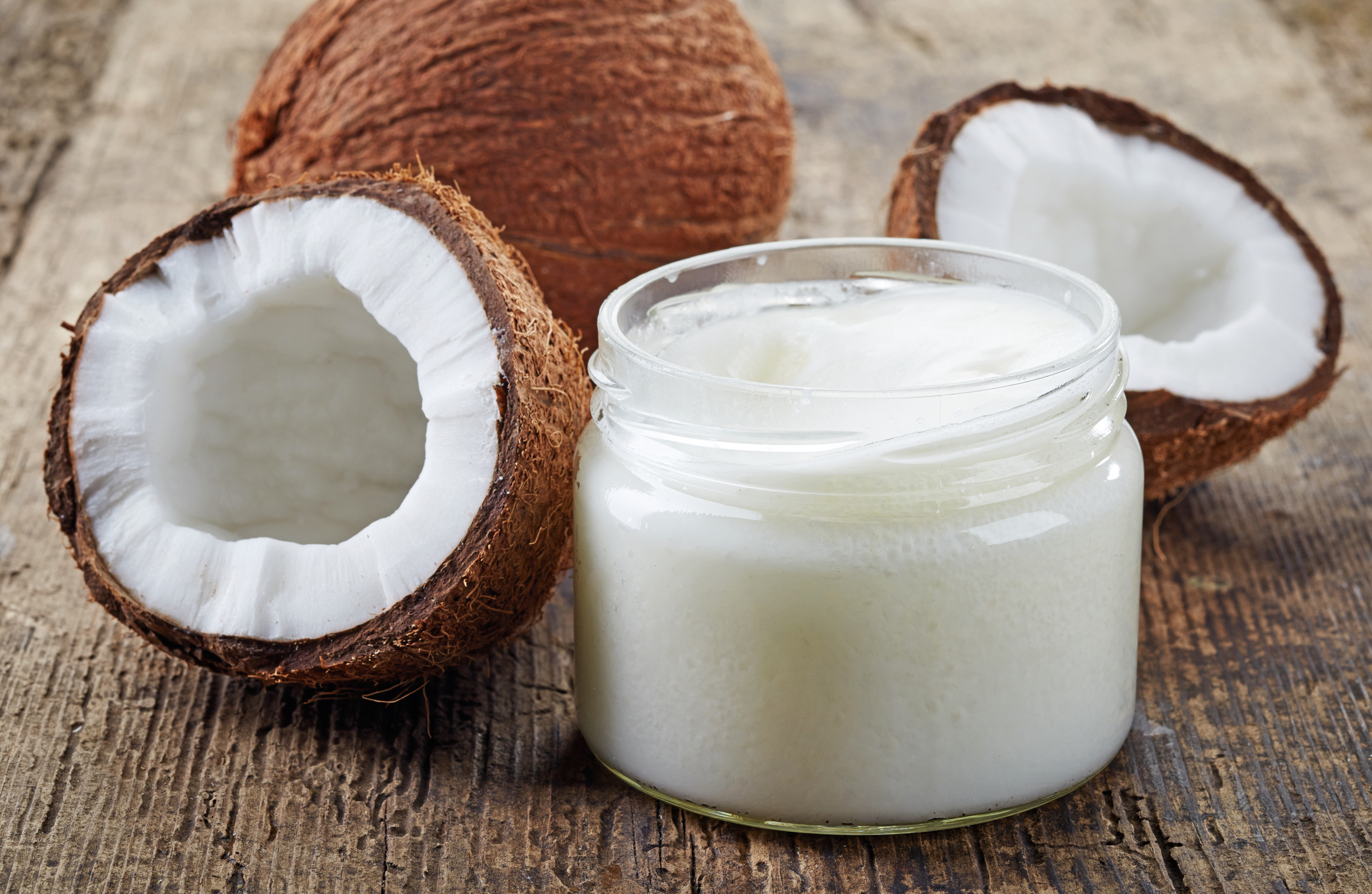[vc_row][vc_column][vc_column_text]Did you know that it’s possible for you to make your own natural lube at home? There are a few household products you’re likely to have in your closet or in your pantry that are great, natural alternatives to store-bought lubricant.
That’s right: you can make your own homemade lube and natural lube.
There’s a whole world out there of personal lubricants that come in any texture, taste, and sensation you could think of. With the wide variety of options, it can be difficult to know which lube is the right one for your body, and which products to get.
There are many reasons you might be interested in making your own lube (beyond being in a desperate situation where you’re with your partner and you run out, and you had no idea you were low on lube). Commercial lubricants often contain ingredients that are difficult to pronounce, and if you’re trying to avoid products that don’t have natural, healthy ingredients, it can be tough to find a lubricant that fits this.
Commercial lubricants can also lead to higher rates of infection and can throw off the PH balance of your vagina. For the sake of your health, you might be curious about trying a more natural, simple alternative to the typical KY Jellies you buy. There are also harmful ingredients in commercial lubes such as phenoxyethanol, parabens, and propylene glycol which can compromise not only the health of your genitals, but your overall health as well.
So, you want to find a more natural alternative and create your own lube at home. However, the process of finding an alternative that not only works, but is also safe, can be daunting. Luckily, there’s a lot of resources out there for you to find all you need to know about using homemade lube and how to make it yourself.
One of the most important things to know is to avoid oils if you or your partner use condoms; oil can corrode the latex of the condom, which leads it to be less effective. The condom could even tear as it’s in contact with oil-based products. In addition, some products that you would automatically assume are okay, such as shea butter, jojoba oil, and beeswax, actually contain waxes that can damage the skin cells of your vagina and compromise its ability to replace vaginal skin. Anything that contains sugar is definitely not recommended as well, because sugar can cause yeast infections.
It’s also important to keep in mind that you should be gentle and careful; the mucous membrane of the vagina is a lot more delicate than your other skin. This means it’s a lot more susceptible to irritation, and it’s easier to hurt yourself. Everyone’s genitals are sensitive, so it’s important that you find great and safe at-home alternatives to commercial lube. Before you try anything new, check in with yourself and your partner to make sure that:
- Neither of you have allergies, and that there is no risk you’ll be allergic to any of the products that you’ll be introducing to both of your bodies
- You do not use products that contain any kind of glycerin or sugar, as this can increase your likelihood of having a yeast infection
- You do not, under any circumstance, use an oil-based natural lube if you rely on condoms.
It’s a lot to keep in mind–but you shouldn’t be scared. There’s a lot of options out there for you to create homemade lube that’s completely safe. There’s also a lot of research, and it’s easy to find resources on this subject, as it’s a common question and many people are trying to find natural alternatives for personal lubricant. Here are some of the ingredients you can use and ways you can make your own.
Related Article: Best Multivitamin For Men
The Best and Safest Ingredients to Use in Homemade Lube
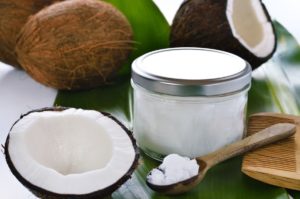

Some household items that are safe for homemade lube include:
- Coconut/olive/avocado oil. Again–do not use this if you use condoms. However, if using condoms isn’t a problem, coconut oil is one of your best bets to reach for when you need homemade lube. It smells good, works well, and can even help prevent yeast infections. Avoid any oils that are flavored; stick as much as you can to oil in its most natural and raw form to avoid any irritation.
- Yogurt. While this may seem like more of an odd/desperate option, yogurt is perfectly fine to use, as long as you steer clear of the flavored kinds such as strawberry and vanilla. You should also make sure it’s sugar free; only use plain, organic, sugar free yogurt if you have any around.
- Margarine. Do not use butter. Margarine however is completely safe to use.
- Primer. Surprisingly, you can turn to your makeup to try to find a solution for your situation. Primers that are oil based will be fine. However, you probably don’t want to end up using your expensive, precious primer all the time–at that point, you might as well spend the money on actual lube, so this is another last-resort case.
- Vaseline. Vaseline is one of your best bets, and besides olive/coconut oil, it’s something a lot of people would consider anyways for homemade lube. The good news is, it’s just as safe and effective as you’re thinking it would be.
As you can see, you have lots of options. If you’re in a pinch and condoms aren’t a factor, your best bet is to reach for Vaseline or coconut oil. In fact, coconut oil is an especially great option–as long as it’s the kind that’s solid and in a jar. This will melt into a slippery oil when it comes into contact with your body. You should also make sure it’s unrefined and has no added sugars. Coconut oil smells great and is inexpensive.
The idea of coconut oil might intrigue a lot of people–it’s been considered a wonder product and can be used for a wide variety of things, both in terms of beauty and your dietary needs. So, you can add this to the long list of things you can use coconut oil for: it makes a great lube.
Related Article: What is Collagen
Recipes for Homemade Lube
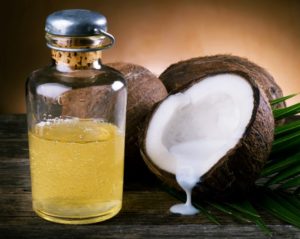

These recipes include:
- Your own water-based homemade lube: Whisk 3 teaspoons of corn flour into 1 cup of hot water until the flour completely dissolves. Put this concoction in a pot and bring it to a boil. Once it’s boiling, take it off heat and whisk until all the lumps are completely gone. Complete a test on your wrist to see if you have any reaction. It works well and is safe, however, be careful with the consistency, as it can become gluey and thick, and this could create a lot of friction (which is the opposite of what you want in a lube).
- Your own oil-based homemade lube: Mix 1-part aloe vera gel with 5 drops of lavender essential oil or peppermint essential oil, as well as 1-part flaxseed oil. Everything should be combined well. Let the mixture sit overnight before using it. A warning: some people actually have a reaction to aloe vera that’s pretty severe. This can be an allergic reaction, or a flare up of contact dermatitis. Peppermint essence can also heighten some people’s sensitivity. Some oils and oil-based lubes can also lead to yeast infections.
- DIY water-based lube: Mix 1 cup of water with 4 teaspoons of cornstarch. Bring this mixture to a slow boil in a saucepan on low or medium heat. Once it’s boiling, stir briskly for 30 seconds, then it should be ready to go–just make sure you allow it to cool before use.
Things You Should Avoid in Your Natural Lube
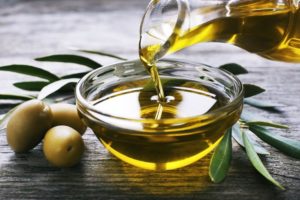

- Honey, which may seem like a no-brainer at first because it’s delicious and slippery. However, the sugar content can lead to bacteria growth and, ultimately, yeast infections. Therefore, you should keep honey away from your genitals.
- Spit, in the case that you or your partner may spread gonorrhea. If neither of you have STDs, spit is safe, but if you’re not sure, don’t use your own spit.
- Fragrances, whether these are in a moisturizer, oil, or aloe vera gel. Fragrances will lead to unwanted irritation.
- Dairy products such as butter. Stay away from anything that has milk or cream in it.
Another warning: whatever type of homemade lube you make, don’t expect to be able to keep it around for weeks or months like you do with commercial lube. Even if you store your homemade stuff in a cool and dry place such as a cupboard, the container becomes a breeding ground for bacteria. Plus, without any kind of preservative it’ll go bad fast. It’s safe to make your own lube–but use it within a couple of days at the most.
It’s also a good idea to always complete a skin patch test before you use your DIY lube on your genitals. What this means is that you’ll test out your homemade lube on a different area of your body, such as your wrist or arm, to make sure you’re not going to have any type of reaction, allergic or otherwise. After all, an adverse reaction can really ruin the romantic mood–and you don’t want to end up getting an infection or irritating your skin.
A great place to test is on the inside of your elbow. Keep in mind that you know your body best, and it might take some experimenting before you find a natural lube that’s right for you. There are plenty of options, for sure.
Household Items You May Not Consider at First
While coconut oil and olive oil may seem like no-brainers when it comes to creating homemade lube, there are other products you’re sure to have at hand that you might not think about at first. Although these might be your second choice or an option when you’re getting desperate, they are efficient and safe.
Aloe Vera
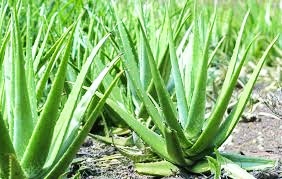

Aloe vera has many antibacterial properties, which means that it can help you deal with other types of wounds on your skin. Plus, it can even ease the symptoms of conditions such as psoriasis and burns.
What a lot of people don’t talk about is that aloe vera makes a great lube. It’s very gentle and has neutral properties no matter what type of skin you have. It’s very safe to use anywhere on your body, including your vagina–as long as you make sure the bottle you have contains 100% pure aloe vera gel, and that it doesn’t have any type of sugar or any artificial ingredients.
It’s recommended, once you dig out that bottle, that you take a test of it and put a little bit of aloe vera on the inside of your elbow first. This way, you can ensure that you’re not allergic to the latex that naturally occurs in aloe vera (and if you already know you have a latex allergy, you should steer clear of aloe in the first place). And, since aloe vera doesn’t contain any oils or any other properties that may break down latex, this slippery stuff is completely safe to use with condoms. In fact, it’s typically an ingredient in lubricants that you’ll buy at the drugstore. Just make sure you use pure aloe vera–not the bright green kind you’ll find at Target during the summer.
Related Article: What is Berberine Good For
Egg Whites


Remember that it’s your body, and if using a specific homemade ingredient for lube seems unethical and disgusting to you, don’t do it. However, rest assured that you won’t get salmonella, as long as you’re using a pasteurized egg white mix. You can check foodsafety.gov if you’re especially worried. Generally, applying egg whites for lube is safe, and doesn’t lead to any side effects.
A lot of homeopathic circles really believe in all the benefits that egg whites have to offer. People who are within these circles not only use egg whites for lube, but also as a means to encourage fertility and to help their ability to conceive. It can be messy when it comes to application, but if you apply it using a dropper of some sort (or just embrace the messiness), using egg whites should be fine. It’s best to apply them at room temperature, in a bowl or other type of vessel.
Oils that are Natural
Certain mineral and vegetable oils, such as olive and avocado oil, are perfectly fine to use as personal lubricant, especially if you’re looking for something that will be efficient for vulvar massage and clitoral stimulation. However, it’s important to keep in mind that you need to keep these oils away if you’re also using condoms, as it could make the condoms break. For this type of home ingredient, whether you reach for it or not may just depend on your intentions for the moment.
Unless you’re using condoms, natural oils are generally great, and are used for massage all over the body because rubbing oil feels really good. Oil-based products also last a lot longer than lubricants that are water-based. This is especially true if the oil you’re using is organic.
In the end, if you are going to use any type of ingredient that you’ll find in your close or your cupboard for a little last-minute lube, anything that’s natural and organic is definitely preferable.
Chinese Yam
The root Nagaimo is commonly known as Chinese yam, and when it’s cooked, it has a very slippery texture. Years and years ago, this root was very commonly used as lube, and if you’ve had experience with it, you know why; it’s very slippery and has a mucous texture. In fact, a lot of people don’t like to consume it due to this
You’ll probably have to go to the store to find this and won’t likely have it in your pantry, but it does work as natural lube. A great recipe is to create homemade lube from coconut oil, Chinese yams, and citrus seed. You can experiment with your own concoctions–just avoid using oil if you’re planning on using condoms.
Your Own Spit
Obviously, spit is always readily available. You don’t have to worry about you or your partner having an allergic reaction to this, and it won’t break down condoms. It’s definitely helpful to use, but how helpful depends on your intentions–it’s best used with something that is self-lubricating, such as the vagina. When all else fails, saliva will do the trick. However, check in with your partner to make sure neither of you are at risk for STDs such as Hepatitis, which can be spread through saliva.
Vitamin E
If you’ve gotten into using essential oils in your daily life, you probably understand the term “carrier oils”. These are oils that you use as a base, to transfer something else–such as essential oils, and to make it easier for your body to naturally absorb what is transferred. Vitamin E is a carrier oil that you might happen to have around, and it’s definitely worthwhile to give it a try as a lube. As with any type of oil, you shouldn’t use this if you’re using condoms.
Almond Oil
Often, almond oil is used as a last-ditch choice. It definitely works as a lubricant, however, you should know that it can be pretty risky, because if you or your partner has a nut allergy, there’s a high chance that applying almond oil topically–no matter where on your body you apply it–can cause an allergic reaction. If you know for sure neither of you are allergic and you’re desperate for something slippery, this will be fine. However, it’s a good idea to consult with a medical professional before you experiment with applying almond oil to genitals.
Conclusion
For anyone who would like to experiment with making their own homemade lube or would like to know what they can grab in an emergency, or simply want to create a natural lube without all those nasty chemicals, it’s easy to change up your lube routine. There are tons of options out there and different ways to create your own natural, homemade lube.
Using your lubricant down to the last drop and having an empty bottle can in a way be a matter of pride, and it shows you were using a quality product. But if you reach for your lube as you’re in the middle of everything with your partner and there’s nothing left, this becomes simply inconvenient. The good news is, there are lots of household products you can use, and you can save yourself a trip to the store at an inconvenient time.
Finding a lubricant that is safe and works well for both you and your partner is a personal journey, so expect to undergo some experimenting. Some homemade lube will work better for a specific type of sex, however, any of your options will in the end effectively do the same thing: make things more slippery. Just keep in mind that you need to be very careful. You should be gentle and cautious any time you put something in or around your genitals, no matter what it is. There’s always a possibility that the foreign substance can mess with your vagina’s PH levels, and there is a risk for yeast infections or bacterial vaginosis. Depending on the ingredients, you or your partner could have an allergic reaction as well. Even organic lubes that are sold in stores, which have great, natural ingredients, could contain ingredients that lead to a yeast infection.
Be safe as you explore what’s best for you. Remember that some of the best household items you can use are Vaseline, aloe vera, and coconut oil. Always make sure that you’re using 100% pure products that are fragrance-free, organic, unrefined, and sugar free. Avoid products that have any type of alcohol in them, such as store-bought aloe vera gel.
And most importantly: oil-based items and recipes for homemade lube are not compatible with condoms, because the properties in oil can break down latex.
If you’re concerned about spreading diseases or getting pregnant, do not use oil-based lube. Oil is a great option for masturbation, just not for intercourse.
Before you use homemade lube, you should have a conversation with your partner about your health–your sexual health, and your health in general. For example, you should discuss your STI statuses, what type of methods you use for birth control, and if you’re allergic to anything that could potentially be in your lube. Using homemade lubricant is something you both should be willing to experiment with. Always discuss things beforehand to know about the risks and possibilities.
Also, before you use any type of lube for the first time (even if you decide in the end to rely on commercial, store-bought lube), you should rub some on your skin and conduct a test to see if it causes any kind of reaction. If it does, or if you’re still nervous, you can consult with your doctor to ask if it’s okay to use a specific product or recipe for homemade lube. In the end, however, there are lots of options, and you’re sure to find something that works great for both you and your partner.[/vc_column_text][/vc_column][/vc_row]
